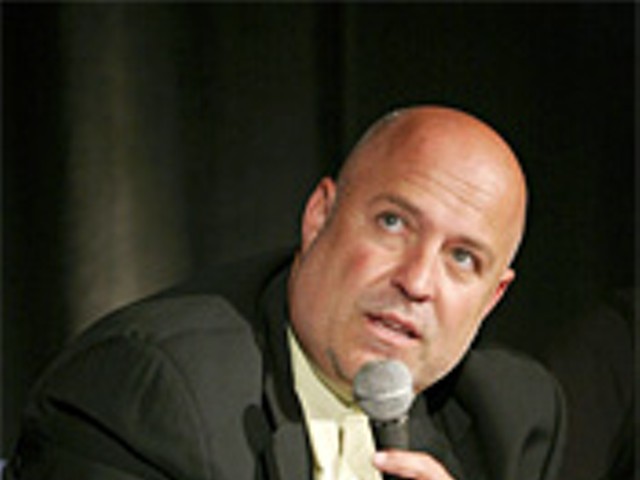Late in the evening, for instance, the eight rowdy title characters — British students who have just endured the rigors of preparing for college entrance exams — come together to sing a sober rendition of "Bye Bye Blackbird." At its conclusion, the audience burst into rapturous applause. Excuse me, folks, but this is not American Idol; we're at a memorial service. Someone has just died. A little restraint, please. The temptation is to suggest that the audience didn't "get" it. But it might well be that I'm the one who's missing out.
I appear to be the product of a deprived education. Unlike the boys onstage, I don't recall any of my professors fiddling with my genitals, nor did I ever ask a teacher for a blowjob. Yet the Rep audience sat there sucking it all in like willing voyeurs; apparently these activities are more commonplace than I knew.
When his characters are not obsessing over sexual peccadilloes, occasionally Bennett does ask probing questions about the nature of teaching. Hector (Thomas Carson), our genial pervert of an English master, embodies free thought. His classes include "silly time," during which he encourages the dissemination of useless knowledge. Even as Hector personifies the past, the bleak future is made manifest in Irwin (Bryant Richards), a newcomer to the school, a no-nonsense professor who approaches examinations as a fact of life, something to be prepared for, even at the expense of a broad education. Obviously we are to root for Hector. But it's a perverse play indeed that tries to transform so pathetic a human being into an endearing protagonist. Whatever happened to upbeat iconoclastic teachers like Jon Voight in Conrack and Sidney Poitier in To Sir, With Love? They engaged in silly time too. Are they now deemed less interesting instructors because they kept their hands to themselves?
Perhaps we're not supposed to take any of this literally. Nicholas Hytner, who directed the London production, describes Bennett as a stylist in the mode of Oscar Wilde. Real people "don't actually talk the way they do" in Bennett's plays, Hytner assures us. So it might make more sense to ignore the substantive themes and instead view The History Boys as a 21st-century Importance of Being Earnest. Then the aphorisms of the hyperbolic Mrs. Lintott — a teacher who we never see teaching; she just wanders around like an unwanted vagrant — can be likened to Miss Pross. Carolyn Swift reads the role of Mrs. Lintott as if she expects to get applause on every exit line, which she never did. On the other hand, as the foolish twit of a headmaster, Anderson Matthews miraculously makes a criminally shallow role credible. Arms akimbo, Matthews seems always about to take flight in a way that the production only rarely does. The staging by Steven Woolf is earthbound. We keep being told how unruly these kids are, but where's the anarchy? Where's the spontaneity? These young actors never speak on top of each other, never jump their cues. They are the best-behaved smartasses you'll ever see.
So no, I don't understand why this play is such a big deal. I don't even understand why the Rep is staging it so soon after the film version was released. What I do understand is that The History Boys is a bona-fide crowd pleaser. If you liked the Rep's Take Me Out two years ago, you'll probably like this one too.





